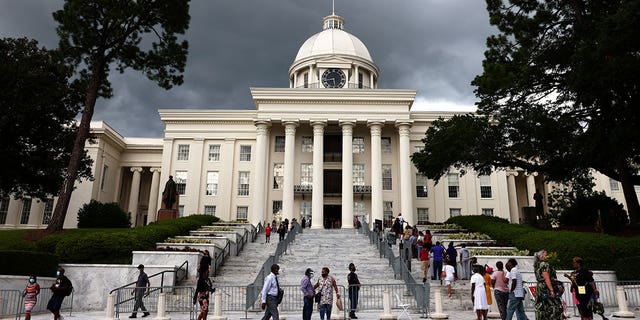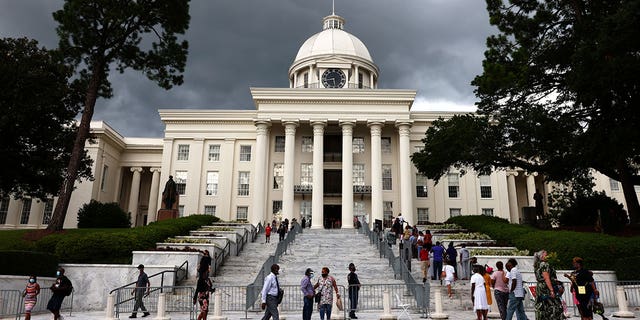
Some Alabama lawmakers are seeking to remove $5 million in funding from the Alabama Department of Archives and History after it hosted a June lecture focused on LGBTQ+ history.
The lunchtime lecture at the Alabama Department of Archives and History titled “Invisible No More: Alabama’s LGBTQ+ History” discussed topics ranging from the state’s first Pride march to the contributions of gay Alabamians.
In response to the lecture, Republican Sen. Chris Elliott of Daphne said he is introducing legislation in next week’s special session that would “claw back” a $5 million supplemental appropriation to the Department of Archives and History.
“And make no mistake about, it is to send a message to the Archives and History Department, and to other bureaucracies throughout the state, that we don’t believe this is a topic appropriate for the Alabama Department of Archives and History,” Elliott said.
WYOMING UNIVERSITY SORORITY PUSHES BACK AGAINST LAWSUIT OVER TRANSGENDER MEMBER
Elliott said about 10 lawmakers had asked officials at the Archives to cancel the lecture, but they did not do so. While he said he had not watched the lecture, which is available on social media, Elliot maintained that he did not think a lecture focused on LGBTQ+ issues was appropriate because the “underlying differentiating factor is sex.”
“There are all kinds of other places to discuss those issues,” he said
Steve Murray, director of the Alabama Department of Archives and History, wrote in a Friday letter to lawmakers that the presentation — part of a monthly lecture series on a variety of topics — “was consistent with the mission of the Archives” to spread knowledge about the history and resources of the state.

People make their way up the Alabama state Capitol. Some lawmakers want to strip funding from the Alabama Department of Archives and History, following an LGBTQ+ history lecture the department hosted. (Michael M. Santiago/Getty Images)
“The Archives respects the authority and responsibility of the Legislature to appropriate funds as you see fit. We hope you will make an informed decision based on familiarity with the June 15 program and awareness of our agency’s commitment to integrity and service in the promotion of evidence-based history,” Murray wrote.
The lecture hosted at the Archives was part of the ongoing “Food for Thought” educational lunchtime series at the Archives. Other lecture topics this year included the Rev. Martin Luther King, musician Duane Allman and the state mammal, a black bear.
TEEN GIRL ACCUSED OF ‘HATE SPEECH’ AFTER PROTESTING TRANSGENDERS IN YMCA LOCKER ROOM: REPORT
Murray said he approved the lecture series topics for the year but the program did not involve public funding other than a federal grant via the Alabama Humanities Alliance to pay a stipend to the presenter.
He said the $5 million portion of state funding lawmakers are attempting to pull back is money the Archives plans to use for museum upgrades, including the redesign of Native American exhibits, a new military gallery and the development of an all-new children’s gallery.
The special session is focused on drawing new congressional maps. It will require the support of two-thirds of lawmakers to pass legislation on other topics, but Elliott said he believes he has enough support.
CLICK HERE TO GET THE FOX NEWS APP
The lecture was given by historian Maigen Sullivan, a co-founder of the Invisible Histories Project, a non-profit dedicated to documenting a once-hidden history of LGBTQ+ people in the Deep South.
Sullivan wrote in an email that the talk explored lesser-known Alabama LGBTQ+ history. She said it “poetically enough” included state lawmakers’ opposition to the creation of a gay- and lesbian-focused student club at Auburn University in the 1990s.
“Despite this being an outrage-fishing performance, this rhetoric is dangerous and harmful, particularly during a time when LGBTQ people, equity policies, and education that equitably represents marginalized people are under active and relentless attack,” Sullivan wrote.








